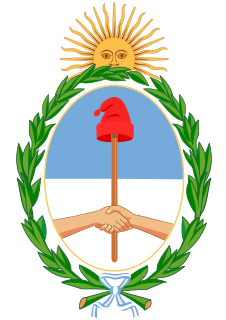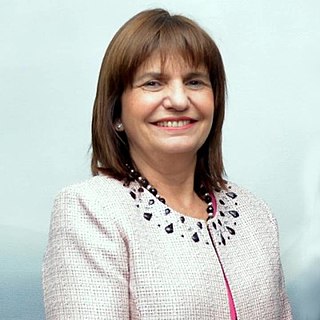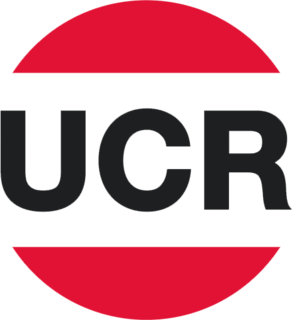The government of Argentina, within the framework of a federal system, is a presidential representative democratic republic. The President of Argentina is both head of state and head of government. Executive power is exercised by the President. Legislative power is vested in both the Executive and the National Congress. The Judiciary is independent from the Executive and from the Legislature.

The politics of Argentina take place in the framework of what the Constitution defines as a federal presidential representative democratic Republic, where the President of Argentina is both Head of State and Head of Government. Legislative power is vested in the two chambers of the Argentine National Congress. The Judiciary is independent of the Executive and the Legislature. Elections take place regularly on a multi-party system.

Raúl Ricardo Alfonsín Foulkes was an Argentine lawyer and statesman who served as the President of Argentina from 10 December 1983 to 8 July 1989. Alfonsín was the first democratically elected president after more than seven years of military dictatorship and is considered the "father of modern democracy in Argentina". Born in Chascomús, Buenos Aires Province, he began his studies of law at the National University of La Plata and was a graduate of the University of Buenos Aires. He was affiliated with the Radical Civic Union (UCR), joining the faction of Ricardo Balbín after the party split.

Civic Coalition ARI, until October 2009 known as Support for an Egalitarian Republic, is a social liberal Argentine political party, founded in 2001 by Elisa Carrió. It is a member of Cambiemos with centrist and centre-right parties.
The Front for a Country in Solidarity was a political coalition in Argentina. It was formed in 1994 out of the Broad Front, which had been founded mainly by progressive members of the Peronist Justicialist Party who denounced the policies and the alleged corruption of the Carlos Menem administration; the Frente joined with other dissenting Peronists, the Unidad Socialista and several other leftist parties and individuals. Its leading figures were José Octavio Bordón, Carlos "Chacho" Álvarez and Graciela Fernández Meijide.
The December 2001 crisis, sometimes known as the Argentinazo, was a period of civil unrest and rioting in Argentina, which took place during December 2001, with the most violent incidents taking place on 19 and 20 December in the capital, Buenos Aires, Rosario and other large cities around the country. It was preceded by a popular revolt against the Argentine government, rallying behind the motto "All of them must go!", which caused the resignation of then-president Fernando de la Rúa, giving way to a period of political instability during which five government officials performed the duties of the Argentinian presidency. This period of instability occurred during the larger period of crisis known as the Argentine great depression, an economic, political, and social crisis that lasted from 1998 until 2002.
The Federalist Union Party, initially named Party of Buenos Aires Unity, is a right-wing political party active in various provinces of Argentina. Its most visible leader is the former police chief, Luis Patti, former Mayor of Escobar, who is accused of torturing people during the last dictatorship.

The Salta Renewal Party is a conservative provincial political party in Salta Province, Argentina.

Argentina held presidential and parliamentary elections on Sunday, April 27, 2003. Turnout was 78.2%. No one presidential candidate gained enough votes to win outright, but the scheduled runoff was canceled when first-round winner Carlos Menem pulled out, handing the presidency to runner-up Néstor Kirchner.

Argentina held national parliamentary elections on Sunday, 23 October 2005. For the purpose of these elections, each of the 23 provinces and the Autonomous City of Buenos Aires are considered electoral districts.

Argentina held national presidential and legislative elections on Sunday, October 28, 2007, and elections for provincial governors took place on staggered dates throughout the year. For the national elections, each of the 23 provinces and the Autonomous City of Buenos Aires are considered electoral districts. Voter turnout was 76.2%.

Rosa Graciela Castagnola de Fernández Meijide known as Graciela Fernández Meijide is an Argentine teacher, human rights activist and politician. She came to prominence by investigating the forced disappearances of thousands of people during the Dirty War. She later served as a deputy, senator, and government minister for the FrePaSo party.

José Luis Gioja is an Argentine Justicialist Party (PJ) politician, former governor of San Juan Province and former President of the Argentine Senate.

The Argentine general election of 1995 was held on 14 May. Voters chose both the President and their legislators and with a turnout of 82.1%.

Argentina held presidential and parliamentary elections on 24 October 1999.

Legislative elections were held in Argentina for half the seats in the Chamber of Deputies and a third (24) of the seats in the Senate on 28 June 2009, as well as for the legislature of the City of Buenos Aires and other municipalities.

Patricia Bullrich is an Argentine politician. She leads the Union for All (UPT), which forms part of the Civic Coalition, and serves as federal Minister of Security.

Margarita Stolbizer is an Argentine lawyer and prominent politician.


















